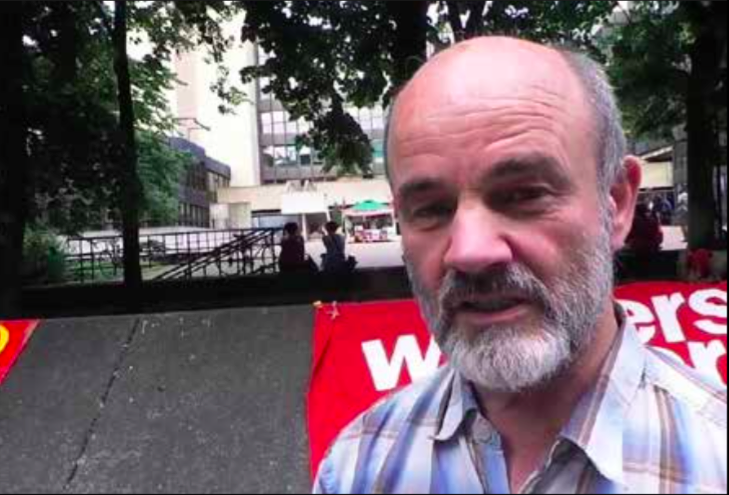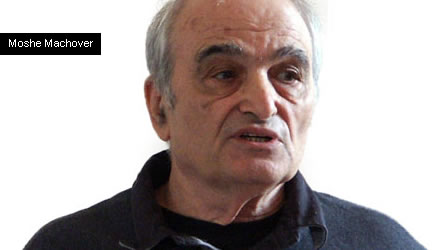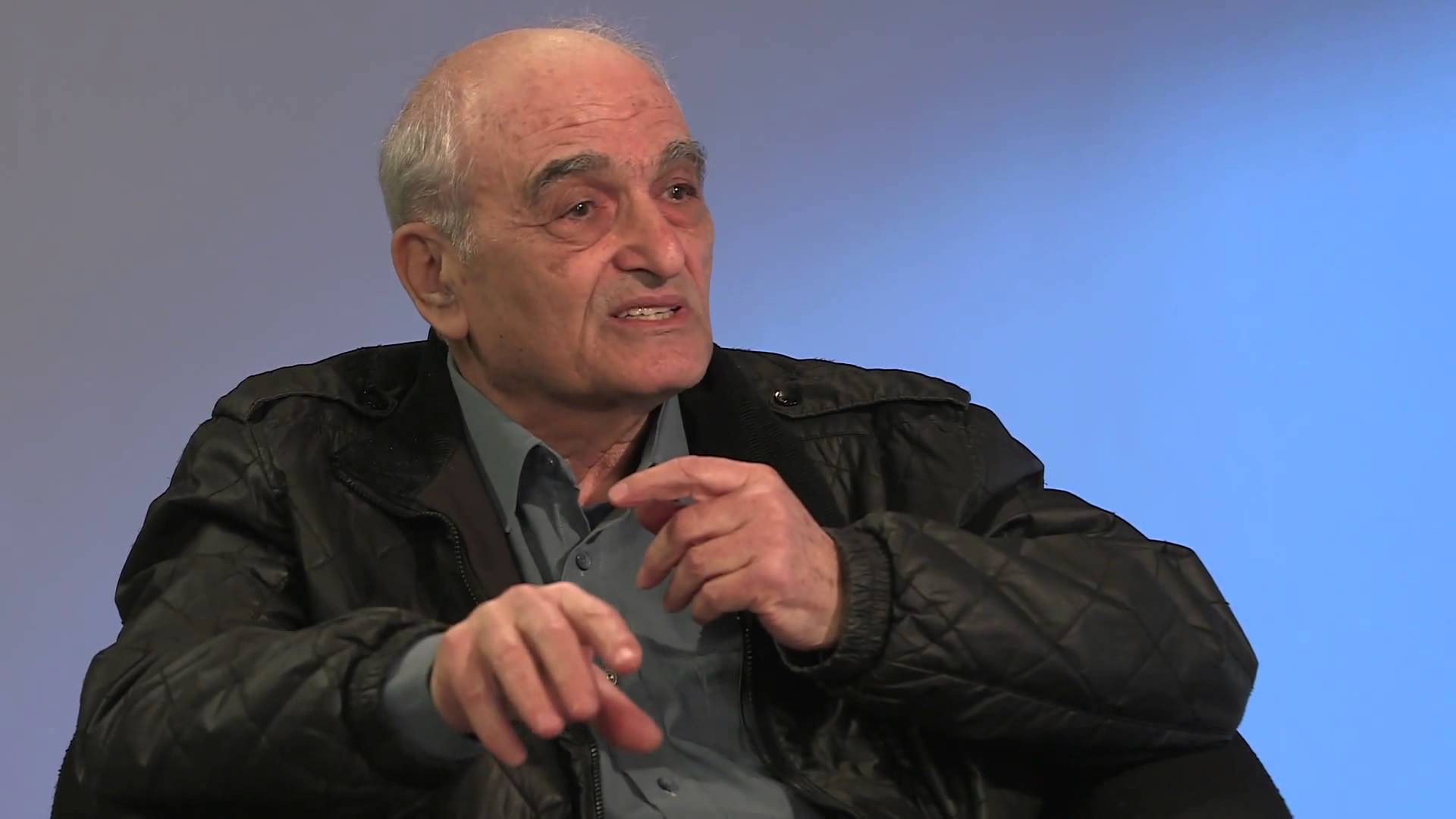Tony Greenstein reports on the case of LPM secretary Stan Keable, whose employer is threatening to dismiss him for comments made in a private conversation
On March 27, the day after he attended the Jewish Voice for Labour counter-demonstration outside Parliament, Stan Keable, secretary of Labour Against the Witchhunt, was suspended from his job because of comments he made in a conversation with a Zionist demonstrator.
Last week I represented Stan at his disciplinary hearing, despite not being from his branch, because Unison’s London regional organiser, Steve Terry, refused to give Stan any support. In a letter dated May 8, Terry stated that because Stan would not accept his advice, Unison was withdrawing its support. He had recommended that Stan apologise for his comments, apologise and plead for mercy. In other words, he was advocating surrender.
Last week I posted an article on my own blog explaining both the background to the case and the role of Terry, who is a rightwing Labour councillor in Walthamstow and now I have received an email from Beth Bickerstaffe, Director of Unison’s executive office, saying that a complaint of serious misconduct has been made against me. I have been requested to take down my post and not to refer to Terry on social media or elsewhere!
The demonstration that Stan attended was organised by two Zionist groups, the Board of Deputies and Jewish Leadership Council. This was their first ever ‘anti-racist’ demonstration. When it came to confronting the British Union of Fascists at Cable Street in 1936, the Board of Deputies recommended that Jews stay indoors and keep their heads down. This was also its message when the National Front and British National Party began organizing in the 1970s and 80s. The Board of Deputies in particular has but one concern: defending the Israeli state.
This must have been the first anti-racist demonstration that the Protestant supremacist Democratic Unionist Party has ever attended. We even had our old friend, Norman Tebbit, there. Tebbit, who was previously best known for having devised the ‘cricket test’ to ascertain whether Pakistani and Indian immigrants should be regarded as British, is apparently also concerned with ‘anti-Semitism’.
As Stan went around handing out leaflets, he got into a conversation about the holocaust with a Zionist and explained that it was not only caused by anti-Semitism (it is obvious that this is correct – it began with the extermination of the disabled, for instance). Stan also explained that Zionism held the view that Jews did not belong in the countries of their birth and because of that the Zionist movement had collaborated with the Nazis, who also wanted them out of Germany.
BBC Newsnighteditor David Grossman secretly recorded the conversation and the result of this quite innocuous conversation was headlines in papers like The Evening Standard and Jewish Chronicleand that well-known anti-racist paper, the Daily Mail. The next day local Tory MP Greg Hands sent out a tweet demanding action against Stan and he followed this up with a letter to Steve Cowan, leader of Hammersmith and Fulham Council, Stan’s employer, demanding action.
Stan was suspended for making “offensive comments” likely to be in breach of the Equalities Act 2010. These comments apparently “have the potential to bring the council into disrepute”. The latter is a catch-all charge, plumbed from the depths of McCarthyism.
Freedom of speech
You don’t have to be a follower of Voltaire or to have read John Stuart Mill’s On liberty to understand that inherent in freedom of speech is the right to offend or shock. If one cannot discuss one’s opinions without a servile member of BBC Newsnight’s thought police recording you, then what is free speech worth?
It is no surprise that Stephen Cowan, Blairite leader of Hammersmith and Fulham council, should seek to effect Stan’s dismissal for daring to voice a dissenting opinion. After all, it is received wisdom amongst our rulers (but precious few others) that Zionism is a good thing, Israel is the only democracy in the Middle East and kosher pigs fly. To dare to voice a contrary opinion on Zionism – the movement responsible for slaughtering dozens of Palestinians this very week on the Gaza border with Israel – risks incurring the charge of ‘anti-Semitism’ and offending all manner of diversity and equality policies.
As Jodie Ginsberg wrote in the wake of the Charlie Hebdo shootings and the murder of a Danish filmmaker by jihadists, “the right to free speech means nothing without the right to offend. If all you have the right to do is to utter platitudes, then free speech is meaningless.”
Of course, Ginsberg was referring o offending Muslims and that is acceptable, but when Livingstone said that Hitler “supported Zionism”, he was merely speaking an uncomfortable truth. Zionism is the ideology of a state that has led to millions of refugees, thousands of deaths and a series of never-ending wars. It is a fact that during the holocaust the Zionists even opposed the rescue of Jews if their destination was not to be Palestine. As Ben Gurion famously said in a speech to Mapai’s central committee on December 9 1938,
If I knew that it would be possible to save all the children in Germany by bringing them over to England, and only half of them by transporting them to Eretz Yisrael, then I would opt for the second alternative. For we must weigh not only the life of these children, but also the history of the people of Israel. 1)T Segev The seventh million London 2000, p28
On August 10 1933 the German Zionist Federation and the Palestinian Jewish Agency signed an economic trade agreement, Ha’avara, with the Nazi state, that helped destroy the Jewish-led international boycott of Nazi Germany.
As Zionist historian Lucy Dawidowicz wrote, on January 28 1935 Reinhardt Heydrich, deputy leader of the SS, issued a directive stating: “the activity of the Zionist- oriented youth organisations that are engaged in the occupational restructuring of the Jews for agriculture and manual trades prior to their emigration to Palestine lies in the interest of the National Socialist state’s leadership.” These organisations were therefore “not to be treated with that strictness that it is necessary to apply to the members of the so-called German-Jewish organisations (assimilationists)” ((L Dawidowicz War against the Jews London 1991, p118; and F Nicosia Zionism and anti- Semitism in Nazi Germany Cambridge 2008, p119. Even Zionist historian David Cesarani noted that “the efforts of the Gestapo are oriented to promoting Zionism as much as possible and lending support to its efforts to further emigration”.2)D Cesarani The final solution Basingstoke 2016, p96
Stan was also accused of breaching the Equality Act because he said that, according to Zionism, “Jews are not acceptable here”.
Perhaps Lucien Wolf, a leading member of the Conjoint Foreign Committee of British Jews, was also an anti-Semite when he wrote a letter to James de Rothschild on August 31 1916 expressing his fears that:
the Zionists do not merely propose to form and establish a Jewish nationality in Palestine, but that they claim all the Jews as forming at the present moment a separate and dispossessed nationality, for which it is necessary to find an organic political centre, because they are and must always be aliens in the lands in which they now dwell and, more especially, because it is ‘an absolute self delusion’ to believe that any Jew can be at once ‘English by nationality and Jewish by faith’. I have spent most of my life in combating these very doctrines, when presented to me in the form of anti-Semitism, and I can only regard them as the more dangerous when they come to me in the guise of Zionism. 3)Reproduced in B Destani (ed) The Zionist movement and the foundation of Israel 1839- 1972 Cambridge 2004, Vol 1, p72
Equality Act 2010
The allegation contained in Hammersmith and Fulham’s disciplinary investigation was that Stan had breached the Equality Act 2010. It is difficult to believe that trained ‘human resources’ professionals can come up with such nonsense. One wonders whether the allegation ever passed the eye of a lawyer in the council.
The suggestion that debating an issue such as Zionism is a breach of the Equality Act is for the birds. The introduction to the act is quite clear. Its purpose is:
to reform and harmonise equality law … to prohibit victimisation in certain circumstances; to require the exercise of certain functions to be with regard to the need to eliminate discrimination and other prohibited conduct … to increase equality of opportunity; to amend the law relating to rights and responsibilities in family relationships; and for connected purposes.
There is nothing in the act about restricting freedom of speech or disciplining people who have views which are unpopular with Britain’s yellow press or its obsequious journalists. The key paragraph in the charges against Stan stated:
“The question as to whether or not Stan Keable’s comments breach the Equalities Act may hinge on an interpretation of what constitutes ‘belief’ under the terms of the act … One of these [protected] characteristics is “religion and belief”. Zionism is not a religion, although it is closely related to Judaism, but it is a belief in the right of the Jewish people to have a nation-state in the ‘Holy Land’, their original homeland. Legal advice, obtained as part of this investigation, states that case law has established that the definition of belief can extend to political beliefs. If Zionism constitutes a ‘belief’ under the terms of the Equality Act then the statements by Stan Keable that the Zionist movement collaborated with the Nazis and that it accepted that “Jews are not acceptable here” might be deemed to have breached the Equality Act.”
Leave aside the nonsense about Zionism being “closely related to Judaism” or that Israel/Palestine is the “original homeland” of the Jews (a popular anti-Semitic misconception of evangelical Christians, who wanted to expel the Jews) there is a fundamental flaw in the above passage, which any child of above-average intelligence should be able to spot.
Zionism probably is a philosophical belief under section 10 of the Equality Act. But then so is anti-Zionism. However, it is not the protected characteristics of those Stan was arguing with which are relevant, but those of Stan! Stan is not their employer! Just because someone might be classified as having a protected characteristic in certain situations – mainly employment – does not mean that if you disagrees with, for example, a gay person you are therefore guilty of discrimination!
‘Protected characteristics’ are not a free-floating cause of action: they are tied to specific acts, such as direct and indirect discrimination, harassment and victimisation. The definition of direct discrimination (section 13.1) says: “(i) A person (A) discriminates against another (B) if, because of a protected characteristic, A treats B less favourably than A treats or would treat others.”
It should be obvious to anyone – though clearly not to those leading Hammersmith and Fulham’s investigation – that debating a topic in a public space does not infringe his adversaries’ protected characteristics. Put bluntly, debate is not discrimination. No-one is being discriminated against when it is stated that the Nazis and Zionists collaborated. Neither was Stan in any contractual or employment relationship with his adversaries.
However, in suspending and seeking to dismiss Stan, the council is almost certainly breaching the Equality Act, because it is Stan whom they are discriminating against on the grounds of his belief. The failure to understand this simple but obvious point is quite staggering.
There is no single definition of what constitutes a religious or philosophical belief, but the case of ‘Grainger plc and others v Nicholson’ set out some guidelines. The belief must be:
- genuinely held;
- not an opinion;
- in relation to a weight and substantial aspect of human life and behaviour;
- of a certain level of cogency, seriousness, coherence and importance;
- worthy of respect in a democratic society, not incompatible with human dignity, and not conflicting with the fundamental rights of others.
If Stan Keable were to be dismissed, then almost certainly he would have been directly discriminated against because of his philosophical belief: anti-Zionism. In addition to being unfairly dismissed, he would also have suffered a detriment.
No demonstrations!
The council’s investigation report (paragraph 5.6) stated:
“in attending the counter-demonstration at Westminster on March 26 and in making the comments that subsequently appeared on social media, Mr Keable has failed to avoid any conduct outside of work which may discredit himself and the council.”
In other words, Stan’s offence was, in part at least, attending a demonstration! Under ‘recommendations’ (paragraph 7.1) we have this little gem – the product of the same bureaucratic mindset that diligently produced ID cards that were nigh impossible to forge in Nazi-occupied Netherlands (thus condemning thousands of Jews to death):
“That, in attending a counter- demonstration outside the Houses of Parliament on March 26 2018, Stan Keable knowingly increased the possibility of being challenged about his views and subsequently proceeded to express views that were in breach of the council’s equality, diversity and inclusion policy and the council’s code of conduct (‘Working with integrity’ and ‘Working with the media’).”
Have you ever heard such a pathetic, cringing, fawning formulation? That in attending a demonstration Stan “knowingly increased the possibility of being challenged about his views …”!
What kind of person is capable of formulating this nonsense? Whoever wrote this drivel should be sent on a prolonged course on basic civil liberties, the Human Rights Act, the Equality Act – and, for good measure, another course explaining why protest is legitimate in a democracy.
We should be under no illusion that the purpose of the false ‘anti- Semitism’ campaign of groups like Labour Friends of Israel and the Jewish Labour Movement – where people are made to feel guilty about saying a word out of place, at the very time that unarmed Palestinians in Gaza are being gunned down in cold blood – is to make people afraid that they might say something ‘anti- Semitic’. The McCarthyite campaign of Israel’s propagandist organisations – such as Luke Akehurst’s We Believe in Israel, is to exert a chilling effect on democratic debate.
If this report is accepted by Hammersmith and Fulham Council and Stan is dismissed, then mere attendance at a demonstration will be a potential breach of one’s employment contract. This is one of the reasons why I have openly criticised Unison’s appalling London regional organiser, Steve Terry. He has in effect accepted that attendance at a demonstration and expressing ones views constitutes a disciplinary offence.
Clearly the fool who drew up the council’s report is unaware of schedule 1 of the 1998 Human Rights Act, which incorporates the European Convention on Human Rights into British law.
Article 10, ‘Freedom of expression’, states:
Everyone has the right to freedom of expression. This right shall include freedom to hold opinions and to receive and impart information and ideas without interference by public authority and regardless of frontiers.
Article 11, ‘Freedom of assembly and association’, begins: “Everyone has the right to freedom of peaceful assembly and to freedom of association with others, including the right to form and to join trade unions for the protection of his interests.” Closely allied to these is article 9 on ‘Freedom of thought, conscience and religion’.
If it is disappointing that a Labour council is prepared to trample over the most basic human rights in order to appease the Israel lobby, then the reaction of Unison in the form of its London organiser is no better. Steve Terry has been obstructive and incapable of acknowledging the issues at stake. He seriously suggested that unless Stan apologised he would only attend the disciplinary hearing as a “silent representative”. The poverty of intellect of Terry is equal to that of his council counterparts. Clearly he does not understand that Unison officials are paid to represent and support their members.
There is little doubt that in the event of Stan being dismissed he will win any subsequently case, because not even the most conformist and timid tribunal will accept that attending a demonstration and airing one’s views in public constitute a breach of the Equality Act or one’s contract. What a sad state of affairs that Steve Cowan and a Labour Council do not understand this and, even worse, that Unison has failed to support one of its members who is subject to such a disgraceful attack by his employer.
References
| ↑1 | T Segev The seventh million London 2000, p28
On August 10 1933 the German Zionist Federation and the Palestinian Jewish Agency signed an economic trade agreement, Ha’avara, with the Nazi state, that helped destroy the Jewish-led international boycott of Nazi Germany. As Zionist historian Lucy Dawidowicz wrote, on January 28 1935 Reinhardt Heydrich, deputy leader of the SS, issued a directive stating: “the activity of the Zionist- oriented youth organisations that are engaged in the occupational restructuring of the Jews for agriculture and manual trades prior to their emigration to Palestine lies in the interest of the National Socialist state’s leadership.” These organisations were therefore “not to be treated with that strictness that it is necessary to apply to the members of the so-called German-Jewish organisations (assimilationists)” ((L Dawidowicz War against the Jews London 1991, p118; and F Nicosia Zionism and anti- Semitism in Nazi Germany Cambridge 2008, p119 |
|---|---|
| ↑2 | D Cesarani The final solution Basingstoke 2016, p96 |
| ↑3 | Reproduced in B Destani (ed) The Zionist movement and the foundation of Israel 1839- 1972 Cambridge 2004, Vol 1, p72 |




